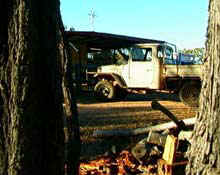« Overland Australia - Update 11 | Main | Overland Australia - Update 13 »
August 6, 2001
Overland Australia - Update 12
August 6, 2001
Pinnacle Springs Station, Almaden
"The first year we were here was the worst - terrible. The drought meant the cattle couldn't keep going. Of the 200 we started out with we lost about 100. Many of them we had to shoot to put them out of their misery. The rest just perished from thirst. We were digging sand out of creek beds where there was a spring. But we had to do it every morning because cattle were pushing in the sand in their desperation to get water. We started feeding molasses - that saved a lot. But it was shocking way to start a cattle station - a shocking start!"
It's 08.30pm. I'm sitting here in the backyard of Pinnacle Springs cattle station with 'Frog' - part owner of a 40,000-acre cattle station called Pinnacle Springs 30km south of the old railway town of Almaden.

We arrived here mid afternoon yesterday after a bumpy 60km ride on the
corrugations from Chillagoe to visit Emma and Laura, two pupils of the Cairns School of Distance Education. They met us at the front gate bare-foot proudly brandishing three newly weaned Kelpie puppies leaning enthusiastically over the lip of a tattered old polystyrene cooler being motored around in a wheelbarrow by one of the girls.
Verna, Peter and Frog (mum, dad and Uncle respectively) were still out at the cattle yard administrating a 20 second baptism of castration and branding to some of 79 weener calves being run through the 'race' that afternoon. We joined them for the closing stages of the rather unfortunate (un)coming of age ceremony, sitting like spectators of a gladiator show on the wooden railings surrounding the pens, before retiring to the homestead for 'smoko' - hot tea and fruit cake.
The story of these people is a classic tale etched from the stuff of early pioneers who scrapping a living from this hard, uncompromising country. They bought 64.5 square kilometers of 'marginal' land for $4 an acre back in 1991. This they reckoned would be enough to just about sustain a family at a ratio of around 40 acres to one animal. The first priority however was water and shelter. Peter and Frog quickly threw up a tin-shed that served as the family home until a new house was built a few years later.
"The roof of the shed was still going on when I had Laura. I wasn't impressed! There was no phone, no electricity - washed everything by hand. Used to pump a bit of water into a tank each day until it would run out, so I'd have to wait until someone would come home and get me some more water. Had a baby. They liked it. They don't mind the dirt.
At that point in time Emma had been diagnosed with Leukemia. I wasn't very happy with having to live in a shed with just dirt and not having any sterile conditions…" Verna Kruckow
Since those disastrous first few drought-ridden years the family have
weathered many other disasters and set backs with the nonchalant calm
of those unattached to the mercurial meandering of what fate can throw at you. One might even say these people are richer than city folks. Their ability to frequently laugh either at themselves or with those around them would certainly reinforce this theory in my mind.
"We're living a dream being out here. Ever since I was 14 I've wanted to
run cattle. So you don't really notice the hardships when you're doing what you want…" Peter Kruckow.
The kids seem to respond well to their surrounding also. We spent the morning sitting in on their schooling, much of it facilitate by the HF radio through the School of Distance Education. Crister, Jim and Aprilalso helped Laura with maths while Emma participated in a Japanese class over HF radio. Because they can't see the teacher, Emma and Laura have learnt to become good listeners - better probably than most kids being taught in the regular school.
And school doesn't end at 3pm in the afternoon either. Be it counting cattle during 'mustering' or learning how to treat for a snake bite, learning in such real-life surrounding continues not only throughout the rest of the day but seems to fuel the appetite for a future of lifelong learning.
jason
LESSON ACTIVITIES >>
Science
Literacy
IT
Education for Sustainable Development (ESD)
Posted on August 6, 2001 12:21 PM